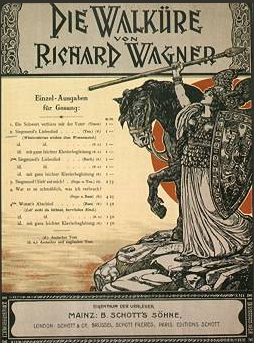 Are the Wagner operas anti-Semitic, and does it matter?
Are the Wagner operas anti-Semitic, and does it matter?
Assuming that a solution to this ongoing quandary is desirable, what would that solution have to take into consideration? What are a State's obligations to sensibilities of minorities, and when does a minority gain a 'heckler's veto' and become oppressive? What about the charges against Wagner and his work? Granted that Wagner's antisemitism is without question, can an artwork be antisemitic, even if it contains no explicit characterization of Jews or Jewish issues? On the other hand, can the art of a doctrinaire antisemite possibly not be an antisemitic work?
First, it should be clear that the categories of today do not do justice to the complexity and fluidity of 19th century social and cultural life which Wagner's life exemplifies. Rising from marginal poverty to the bourgeoisie, Wagner was constantly morphing: from a low-level court servant to a convert to revolutionary socialism, a publicity-driven showman, a monarchist and, finally, a Victorian institution. It was perfectly possible in the liberal-monarchy of Bavaria to be both an anti-Semite and a close friend and collaborator with Jews, even a Jewish anti-Semite. It was also possible for Jewish Germans to embody French culture (Offenbach), or to create a national voice for German poetry from a sickbed in Paris (Heine). One could base one's echt-German philosophy, as Wagner did, on Schopenhauer, who openly derived his beliefs from a study of the Bhagavad-Gita. The categories of Jew and German, Western and Oriental, radical and reactionary, in the analysis of 19th century cultural products and producers simply do not hold.
Nonetheless, Wagner's aspirations towards music as a ritual for German cultural purification must be faced head-on. Many serious analysts have claimed in recent decades that the works of Wagner are, in fact, heavily-coded antisemitic polemics, recognizable as such to his contemporary audiences if not to our own. In Richard Wagner and the Anti-Semitic Imagination (1995), Marc Weiner analyzes a vast system of antisemitic codes which, he claims, were systematically implanted by Wagner into all his artworks and which would have been clearly recognizable to his listeners. The result of his research is a 400-page chronicle, categorized by subjects -- "smells", "feet", "voices" - a lexicon of the semiotics of Wagnerian racism. A central meaning of Wagner's works, a central purpose, is antisemitism.
Notwithstanding such analyses, a purely objectivist critique could argue, following William Wimsatt and Monroe Beardsley, that artistic intent is irrelevant. Music is music. An artwork must be examined as it is, devoid of the mystifications of allusions or biography. Even if Wagner's musical semiotics communicated a message in 1883, that message is not "in" the music; it is in how the music was understood at a particular time. The music itself can be separated from its context.
A more subtle critique, drawing on contemporary post-structuralist theory, would be to say that, while there is no such thing as an independent, non-contextualized artwork, there is also no reason to favor one context over another, and to contend that Wagner's contemporary audience was necessarily a more accurate interpreter of his creations than we are. Perhaps, in our separation from the antisemitic context, we are getting Wagner's music more "right" than Wagner himself. We cannot hope to understand a work outside of its original context, nor can we understand it within its context. What we hear is a new text, different from that written by Wagner. Thus when we ban an artwork, we ban something we prefer not to experience now, not a particular message from the past.
Indeed, one of the experiences which is available today is a complex appreciation of music, politics, and the signifiers of bigotry. One could adopt Edward Said's ambivalence, necessary not only to appreciate Wagner but also any writer or artist whose political/racial views are objectionable. Or one could follow Marc Weiner, who concludes that by recognizing Wagner's ideological signs and measuring our cultural distance from them, we can achieve a kind of "redemption for post-Wagnerian culture from the composer's utopian program," while staying wary of the way in which some of Wagner's coding, such as "the stench and the color of the despised foreigner" still have cultural currency today.
 Some believe that Wagner's music is irredeemable. The most obvious reason that such
critics provide is that the works have indeed been too tainted by subsequent history
for a contemporary "rescue" to be desirable. Joachim Köhler's
Wagner's Hitler: The Prophet and his Disciple, a persuasive (if poorly documented) polemic that Barenboim himself cited as a must-read for those interested in the impact of Wagner's philosophy on Hitler the Holocaust. Hitler's blind adoration of Wagner and Wagnerism, says Köhler, led him to seek to put Wagnerian aesthetics and philosophy to work as a sort of life-plan. In fact, without Wagner's intellectual substructure, Köhler states, the Holocaust would not have occurred -- the Holocaust itself is inherently Wagnerian. Wagner made it possible for educated people to adopt beliefs which, as Hitler observed in Mein Kampf, would have been thought
of by earlier generations "as cultural backwardness." (Vol 1., Chap 2.)
He both gave antisemitism intellectual credibility
and also inspired Hitler's long-term program. It's
a bit much to depict the Final Solution as, say, the fifth
opera in the Ring Cycle, but, Köhler proposes, Hitler may
well have seen it that way. The argument would follow that, no matter how we might take a different reading of Wagner's operas today, their historical consequences were so horrific that to do so is itself an offense.
Some believe that Wagner's music is irredeemable. The most obvious reason that such
critics provide is that the works have indeed been too tainted by subsequent history
for a contemporary "rescue" to be desirable. Joachim Köhler's
Wagner's Hitler: The Prophet and his Disciple, a persuasive (if poorly documented) polemic that Barenboim himself cited as a must-read for those interested in the impact of Wagner's philosophy on Hitler the Holocaust. Hitler's blind adoration of Wagner and Wagnerism, says Köhler, led him to seek to put Wagnerian aesthetics and philosophy to work as a sort of life-plan. In fact, without Wagner's intellectual substructure, Köhler states, the Holocaust would not have occurred -- the Holocaust itself is inherently Wagnerian. Wagner made it possible for educated people to adopt beliefs which, as Hitler observed in Mein Kampf, would have been thought
of by earlier generations "as cultural backwardness." (Vol 1., Chap 2.)
He both gave antisemitism intellectual credibility
and also inspired Hitler's long-term program. It's
a bit much to depict the Final Solution as, say, the fifth
opera in the Ring Cycle, but, Köhler proposes, Hitler may
well have seen it that way. The argument would follow that, no matter how we might take a different reading of Wagner's operas today, their historical consequences were so horrific that to do so is itself an offense.
One of the disturbing consequences of such an argument, though, is that it could apply to anyone. Yesterday Wagner, perhaps tomorrow Beethoven, or Mozart - what music is safe from some future despot bending it to his uses? One is reminded of A Clockwork Orange, in which the music of Beethoven is ruined for the protagonist Alex by being juxtaposed with scenes of horror which he witnesses in his aversion therapy.



The Hamas Class of 1992
Michael Shurkin
Every City has a Soul
Jill Hammer
Wagner in Israel
Margaret Strother
Wrestling with Steve Greenberg
Jay Michaelson
T Cooper
Abi Cohen
The Stable
Ira Stone
Archive
Our 450 Back Pages
Saddies
David Stromberg
Zeek in Print
New Spring 2004 issue now on sale!
About Zeek
News & Events
Contact Us
Tech Support
Links
From previous issues:
The Sacred and the Profane
Douglas Rushkoff and Jay Michaelson
More than This
Dan Friedman
Life During Wartime
Jay Michaelson